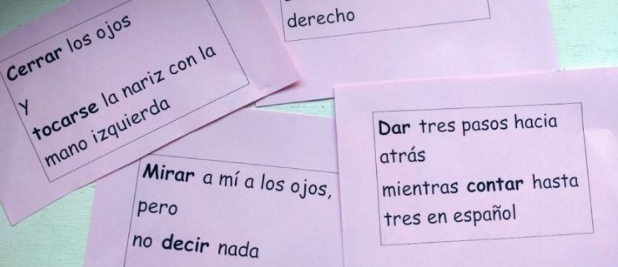
Role-play, Polling and Brainstorming in Spanish
|
Title of case study |
Role-play, Polling and Brainstorming in Undergraduate Spanish |
|
School/Subject: |
College of Arts and Humanities: School of Modern Languages & Cultures, Spanish |
|
Lecturer(s): |
Mónica Legazpi-Iglesias |
|
Course: |
Spanish Language 2 (HISP2011) Interpreting skills in Spanish (HISP4019) |
|
Student Level: |
Year 2 UG & Year 4/5 (Honours) UG |
|
Class size:
|
116-120 for Spanish Language 2 30 (two separate groups) for Interpreting skills in Spanish |
|
Location: |
On campus/in person & online / distance (during the Covid pandemic) |
Brief summary
While learning to communicate in a foreign language is important, given the limited number of teaching hours it is equally key to ensure students are able to use the grammar correctly. This understanding will help them in their independent learning time and will be very useful during their required stay abroad (year 3) in that foreign country. Mónica Legazpi-Iglesias utilised brainstorming and role-play methods in two of her Spanish courses to allow students to put content elements (language structures) into practice while revising and consolidating grammar knowledge.
The Spanish language 2 course offers a weekly lecture on grammar, followed by two seminars that aim to enhance the students’ listening, writing, reading, and speaking skills. An active learning method used to check whether knowledge of a particular grammar concept has been consolidated is role-play. Students work in groups to role-played different scenarios while using the newly learned grammar concepts.
The Interpreting Skills in Spanish is an Honours Option course which requires students to master a number of skills gradually, before eventually combining all skills at once while interpreting a speech. Those skills are researching a topic, creating a glossary of useful and/or necessary terms for this topic and for the speech in question, active listening (to identify the main ideas of the speech). Brainstorming in small groups allowed students to share the glossaries they have compiled, and to discuss and agree on which are the main ideas that must be communicated.
Both methods in the two courses bolstered students’ engagement, creativity, language skills and motivation to learn Spanish, with the latter course further enhancing students’ research skills as well.
Objectives
In both instances, my biggest aim was to increase student engagement and
to foster a relaxed environment in which most learners will feel inclined to participate. In the case of Spanish Language 2, I wanted to create a scenario where students themselves were able to check their understanding of grammar. By incorporating Mentimeter quizzes designed to reflect about grammar use, I managed to shift towards more active student engagement in the lectures. Making mistakes seemed less daunting as the answers to the quizzes were anonymous.
The concepts explored in the lecture were put into practice in the two seminars that follow. Role-play is an effective way to encourage people to speak. However, providing prompts rather than a script involved students further. It demanded students assess their understanding of the grammar the situation required them to use. It is important for me that students realise how useful certain grammatical concepts like the subjunctive or the imperative mood, are in real life. Role-play scenarios achieved this perfectly. Students felt engaged and wish to communicate. While participating in the role-play, making mistakes did not seem to matter as much as fluency.
Specifically for the Interpreting Skills course, I wanted students to learn how to combine different key language skills – topic research, glossary building, mind-mapping and information paraphrasing. Mastering these skills gradually will reduce their cognitive load and build their confidence when having to interpret a speech in real time.
What is done?
Roleplay in Spanish Language 2
The lecture introduces the grammar topic. For instance, the use of the Imperative Mood, used for making requests, demands, and giving instructions. Attention is paid to the cultural differences and contexts where its use would be expected. The different forms are explored (i.e. affirmative or negative command addressed to one person or to a group, in a formal or an informal context). Students engage with Mentimeter quiz so that the lecturer can gauge understanding and consolidation of the topic.
In the first seminar (groups of maximum 16 students) following the lecture, students are asked to participate in a role-play. Divided in smaller groups (of approximately 3-5), students stand up and collect a coloured piece of paper where they can read the elements to make a request or give an instruction. They need to apply their knowledge of the imperative mood to produce that instruction and say it aloud to a member of their group who will perform it. Members of the group help each other formulate the instructions and perform the actions. The tutor monitors the group’s work and offers feedback. Learners have reported they enjoy the activity; we witness them having fun doing it, and they will hopefully remember better the grammatical structure as they were doing something with it; they were using it in a real-life context. Some of the prompts are: “look me in the eyes but do not say anything”, “Take three steps backwards while counting up to three in Spanish”, etc.

Interpreting Skills
As interpreting is a stressful task which combines a number of skills, during the first few weeks of the course we stress the importance of preparation. Students attend the weekly seminar having researched a given topic. This includes getting to know the background of the issue, and compiling a glossary in English and Spanish of specific terms related to the topic. The skills that brainstorming helps with are the identification of main ideas and mind-mapping.
Having researched the topic before attending the seminar, we listen to the speech once or twice depending on level of difficulty. In small groups of 3-5, students engage in brainstorming in order to create a mind-map of the main ideas. Alternatively, they produce a list of those main ideas as well as how they are connected.
Collaboration is usually fruitful as it also allows them to double-check understanding of the ideas expressed, or of challenging language elements. The goal is twofold: 1) for students to collaborate regularly in order to feel comfortable amongst their peers; and 2) for students to gradually gain confidence in their abilities.
There is a point in the course when the brainstorming step is skipped, and learners share their lists of main ideas, and we proceed to the actual reformulation of the speech in the target language.
Resources required:
- Prompts printed on coloured pieces of paper.
- The JMS room has great acoustics and three whiteboards (great for students to share their thoughts).
What works well?
The most positive aspect is definitely students’ increased motivation and eager engagement with the activities, articulating their thoughts on the topics too. The same motivation also enables students to become creative, coming up with interesting ideas/scenarios to role-play, which are great fun and very convincing. The great majority of students enjoy it significantly and mention it in feedback to the class representative. It is rewarding to see an activity you believe has learning benefits being so effective.
Benefits
|
Students |
Staff |
|
|
Challenges
|
Students |
Staff |
|
|
What did you learn?
I have learned that introducing enjoyable activities in class brings learners and facilitators closer and helps establish the learning community. I believe that learning by doing is not only fun but much more effective than other methods. Involving learners in doing something will hopefully attract their attention.
During the seminars themselves, I realised how useful alarms are when timing the activities. Sometimes students might be so engaged that they don’t hear you wanting to wrap up the discussions, so an alarm is always useful for this.
For the future, I will keep using these methods– they work, and students enjoy them.
In Spanish Language 2, I would like to further combine the role-playing method with the use of Mentimeter or Padlet in revision activities. In the exam, students are expected to reflect about the use of grammar. I would like to reinforce this practice in class and increase the opportunities we offer learners to explain why a particular grammar concept is being used rather than only using it because it ‘feels right’.
What advice would you give to others?
Using role-play and brainstorming helps understand the value of the outcome of the ILOs you want the students to learn. Practice-wise, when you use such methods, always remember to explain very clearly the instructions of the activities and what is expected of the students. And, of course, be mindful of the time!


